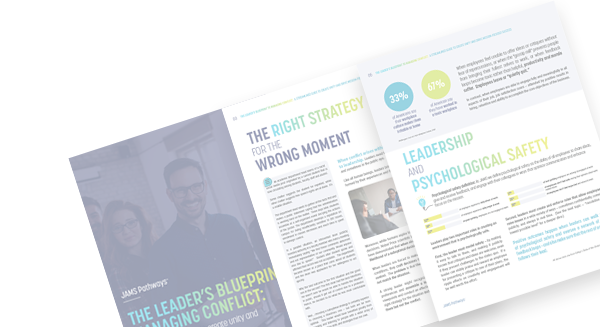News & Insights
BROWSE TOPICS
Argument or Discussion: The Purpose
Sometimes we may miss the point, the objective, of heated communication
KEY POINTS

In today's increasingly divided society, effective communication is critical, particularly when navigating workplace disagreements. An article in Communication Intelligence explores how professionals can better handle conflicts by understanding the difference between an argument and a discussion. Various professionals, including Rich Birke, chief architect of JAMS Pathways, alongside communication advisors like Jeremy Ross and Joe Jotkowitz, offer insights into transforming conflict into productive dialogue.
Definition and Characteristics of an Argument
An argument, as explained by Rich Birke, is explicitly about persuasion.
"The aim of an argument is to convince someone to adopt a particular point of view.”
Arguments often become competitive discussions, focusing on victory over mutual understanding. In workplace disagreements, this type of communication can deteriorate relationships. Birke warns that forcing opinions too strongly can damage trust, a key reason why arguments must be handled carefully.
Definition and Characteristics of a Discussion
In contrast, discussions are about exchanging ideas, where the goal is not to win but to understand. Birke defines discussions as less zero-sum, meaning they are not about one winner and one loser. Discussions are often more effective than arguments when the focus is on collaboration and shared understanding. What is the purpose of an argument versus a discussion? While arguments aim for persuasion, discussions seek progress and empathy.
Understanding the Purpose of Arguments and Discussions
The article emphasizes that many professionals, particularly in the business world, treat discussions as contests, a behavior that is not conducive to productive outcomes. Birke and his colleagues stress that the aim of a discussion should be to build rapport and create opportunities for understanding. Jeremy Ross, a publicist, notes that establishing emotional intelligence in arguments is essential. Building relationships and empathy may help others feel heard, which can be crucial in workplace debates. This mutual respect transforms a conversation from a combative argument into a fruitful dialogue.
Strategies to Navigate from Argument to Discussion</h2>
Rich Birke offers actionable strategies for navigating the space between argument and discussion. The first step, according to Birke, is to listen more than you speak and to ask open-ended questions. These approaches reduce confrontation and encourage the transition from argument to productive discussion. He emphasizes that transforming conflict into dialogue starts with acknowledging the other person’s viewpoint, a method that reduces barriers and builds a foundation for future conversations.
Joe Jotkowitz adds that entering a disagreement with the mindset that you could be wrong opens up the conversation to new ideas and reduces unnecessary conflict. This approach can also lead to improved relationships in the long run, something crucial for repeat interactions, such as those between co-workers or clients.
The Role of Conflict Resolution in Shaping Arguments and Discussions
Conflict resolution plays a pivotal role in helping individuals and teams navigate arguments. Birke explains that learning from conflict resolution strategies not only helps in the short term but can also foster long-term cooperation in many cases. In most scenarios, arguments are part of ongoing relationships. Therefore, using examples of effective dialogue, Birke demonstrates that many conflict resolution professionals believe winning an argument is often not the best strategy for sustained success. Instead, discussions should aim for cooperation and collective progress.
The professionals featured in the article agree that while some disagreements require quick decisions, the majority of professional and interpersonal relationships thrive on understanding and mutual respect. By fostering this type of interaction, professionals can reduce the reasons for workplace debates and replace confrontations with constructive communication.
If you’d like to read more about how to navigate workplace conflicts and transform arguments into productive discussions, click here to view the full article.
This page is for general information purposes. JAMS makes no representations or warranties regarding its accuracy or completeness. Interested persons should conduct their own research regarding information on this website before deciding to use JAMS, including investigation and research of JAMS neutrals.

Start Your Journey Now
Book a Free Discovery Call
Book a discovery call today.
Customized Client Solutions
Download our streamlined guide
The Leader's Blueprint to Managing Conflict
In this practical, step-by-step playbook, our experienced facilitators explain how to efficiently resolve workplace conflict to create unity and drive mission-focused success.



